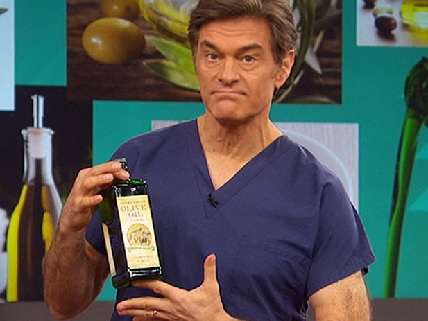Dr. Oz Rebuffs First Amendment Challenge by Olive Oil Industry
Do you love the First Amendment but detest Dr. Oz? Read on.

Last week, a Georgia state judge dismissed a lawsuit filed against talk-show host Dr. Oz over claims made on his show last year that much of the olive oil sold in U.S. grocery stores is fraudulent. The suit alleged that Oz wrongly disparaged the corrupt olive oil industry.
The lawsuit was brought against Oz by an industry trade group, the New Jersey-based North American Olive Oil Association (NAOOA), under Georgia's so-called veggie libel law. It's one of about a dozen states with these awful laws—which allow a party to sue for damages if a person allegedly disparages their agricultural products—on the books.
Oz won in court thanks to Georgia's anti-SLAPP law. Such laws gives people who speak out on issues of public concern a useful tool to counter lawsuits that seek to intimidate them into silence. ("SLAPP" is an acronym that stands for "strategic lawsuit against public participation.")
Several domestic olive oil brands had also been sued alongside Oz.
Fraud in the olive oil business is, in fact, a longstanding problem. A 1917 Missouri court case, Lo Buono v. V. Viviano & Bros Macaroni Mfg. Co., centered on fraudulent olive oil, as did a 1950 federal case involving another producer. In the past decade, The New Yorker has dedicated at least two lengthy pieces to the issue of fraudulent olive oil. And Congress recently held hearings on the issue.
The fictional Corleone crime family in Mario Puzo's The Godfather used its olive oil business, Genco, as a cover for its criminal activities. That depiction of mafia involvement in the olive oil trade isn't far from the truth in some cases. Facing U.S. tax fraud charges in 1951, mafia boss and drug trafficker Francisco Paolo Coppola claimed to earn much of his income as an olive oil producer.
How does such fraud play out? An olive oil might be misbranded, claiming to be of higher quality than it really is—from an earlier pressing, for example—or to be from one country but hail from another. Or it might be adulterated, containing—for example—a mix of olive oil and other less expensive food oils.
In fact, the NAOOA, which represents many foreign olive oil producers, whose products make up the bulk of the olive oil sold in the United States, is itself keen to identify and prevent such fraud in the industry. A 2015 report issued by the group, for example, raises "significant questions" about the quality of California olive oils tested by NAOOA.
The NAOOA clearly understands the value of free speech.
Listen, I think Oz is a quack. Forbes writer Kavin Senapathy, whose writings expose quackery around food, was probably right when she called Oz's olive oil segment as "yet another gag in his lineup of shady antics."
But it's also another reminder of attacks on Dr. Oz's First Amendment rights.
In 2014, Oz was called before Congress to explain his claims about a variety of foods and supplements he claims have particular health-promotion qualities.
"Oz has absolutely zero responsibility to hold mainstream views and every right to make money off of those views," I wrote in a 2014 piece defending Oz's free-speech rights and attacking Congress for attempting to intimidate him into silence. "His popularity has absolutely no impact on his right to say whatever the hell he wants to say. And being hauled before Congress for saying what he wants places a tremendous burden on his, your, and my First Amendment rights."
As a reminder, the First Amendment protects speech regardless of its subjective value. It protects speech by neo-Nazis and Black Muslims, pornographers and religious zealots, and climate change alarmists and deniers alike. And your right to speak freely is stronger today thanks to a renowned medical doctor who freely espouses many views that appear, by any reasonable measure, to be objectively false.
Critics of Oz are free to rail against his idiocies. I hope they'll continue to do so. But when courts and lawmakers attempt to intimidate him into silence, they are more apt to turn Dr. Oz into a First Amendment hero than expose what he truly is.


Show Comments (32)